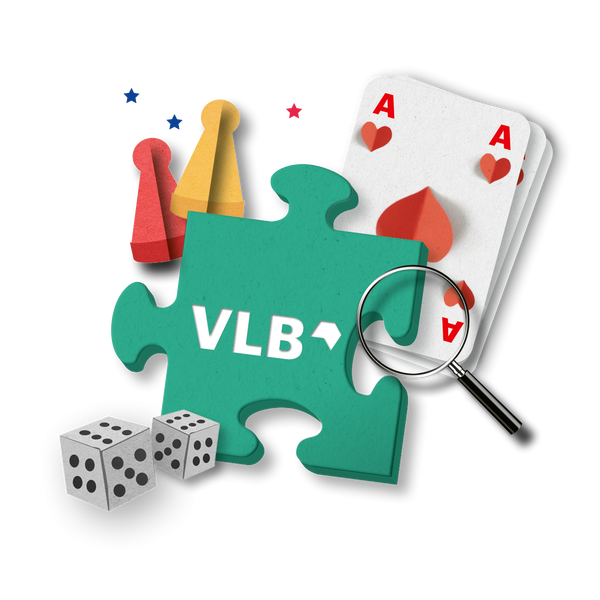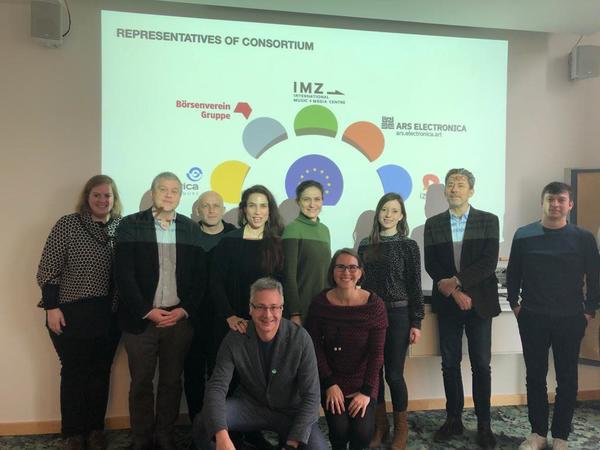“Only products that are visible will find their way to customers.”
Games in the book trade: more visibility for more sales
From classic board games to puzzles for all age groups to escape-the-room adventures – games have been growing in popularity for several years now. And the coronavirus pandemic has given an extra boost to this positive trend. At the same time, there is marketing potential that remains untapped, for example due to the reduced visibility caused by the lack of standard product categories.
Suppliers and retailers can benefit from the book industry’s know-how here – such as its experience with the Verzeichnis Lieferbarer Bücher (VLB), the catalogue of books in print used in the German-speaking world. The VLB is a centralised, comprehensive metadatabase for product information, one that also covers non-books such as games, offering them yet another sales channel.
In this interview with Dr Monica Wellmann, we spoke about how the book trade and game industry can benefit from closer cooperation when it comes to discoverability, and how they can expand their cross-selling activities.

© Stefan Hoening
Monica, as head of Marketing & Sales for the Digital division at technology and information provider MVB, you are responsible for integrating games into the VLB, among other duties. What does that entail?
We in the book industry are in the fortunate position of being able to make one million products from a wide range of suppliers available to locations throughout Germany overnight, using a close-knit network of retailers. Only the pharmaceutical industry can say the same.
The foundation of this sophisticated logistics system is, among other things, the use of ISBNs to identify each product, and the VLB as a neutral, competition-promoting platform for exchanging the relevant metadata across the German-speaking world. I am deliberately using the term “product” here, since it’s not only about books. Non-book articles relevant to the book trade, such as games, are also listed in the VLB.
Together with my team, I am responsible for ensuring that as many publishers, producers and retailers as possible know the advantages of the services we offer – and make use of them too.
Games and books. Do they go together?
Perfectly! Both are cultural items that appeal to a similar public. And they serve similar needs, for example by providing entertainment, opening the door to other worlds, or promoting strategic thinking. Games and books are intellectual nourishment that we can’t and don’t want to do without – as is particularly clear right now.
Games and books are also a good fit in that there is a huge range of existing products in both areas, a range that is augmented year after year by many new releases. It’s hard to keep track of them all – both the products that people want for themselves and the ones they want to give as gifts.
Which games are particularly suitable for selling in bookshops?
There are two perspectives here: On the one hand, pocket-sized games are well suited as impulse purchases and gifts. Think of children’s birthday parties. On the other hand, there are high-end products which match the bookseller’s own assortment and which aren’t the kind of generic item that you find piled up everywhere else.
It’s hard to earn any money off of bestsellers – think of the annual “Game of the Year” – in view of the discount wars that take place in retail stores and on the major websites. But if shops offer a diverse selection of new and unknown articles, not only will customers smile, they’ll also reach for their wallets.
Specialty stores for toys and games are on the decline. How is that impacting local booksellers?
This development is opening up opportunities for the stationary book trade, especially in rural areas – above all in those locations where there are no large supermarkets or drugstores in the immediate vicinity. After all, being able to order a wide range of games overnight makes bookshops attractive as on-site suppliers. The book trade can benefit from structural change in urban settings as well, since traditional department stores are increasingly disappearing as sales outlets for games.
Of course, if you have your own selection of games, you also need the expertise within your team to market the products by making recommendations. If bookshops then allow customers to test the games in the store and if they even organise game-playing events, then they will not only be closing the gap in terms of availability, they will be giving themselves an attractive and unique selling point. This sort of “community management” can result in a sizeable increase in customer loyalty.
What role does discoverability play in games sales?
The game industry is answering that question itself – by focusing on visibility. “Discoverability” has been chosen as the theme for the 2021 Hamburg Games Conference, and Nuremberg’s Spielwarenmesse, the trade fair for toys and games, has just announced an innovative business platform for 2022: Spielwarenmesse Digital, which is meant to complement the in-person fair.
As mentioned, the assortment of games is large and diverse. That’s why tools are needed that provide guidance and increase visibility at all the analogue and digital touch points. Ultimately, only products that are visible will find their way to customers. It all starts with general information, such as age range, number of players, and time needed to play, and extends to genre classifications and thematic groupings.
How does MVB intend to increase the visibility of games?
In various ways: We’ve just created the option of storing additional descriptive information in the VLB and are now promoting it to our existing customers. As a first step, this information includes the number of players, time needed to play a game, and links to Youtube videos that show, for example, how the game works in practice. In the next step, we are talking with suppliers who do not yet use the VLB or are not even aware of it, since they have had little or no contact with the book industry to date.
In parallel, we are working with many partners – such as the research organisation Institut für Ludologie and the trade associations Spiele-Autoren-Zunft e. V. and Spieleverlage e. V., as well as the Product Metadata interest group at the German Publishers & Booksellers Association – to create standards for systematically cataloguing games. After all, providing guidance is only possible if products are categorized according to a uniform principle. We’re already much further along in the area of books. Our intensive, years-long cooperation with international standards-setting organisations and our experience automating the exchange of metadata are key inputs for this process.
And let’s not forget: We’re engaged in a conversation about this topic. Our goal is to increase awareness for new sales potential through cross-selling on both sides, in the game and the book industries.
Which aspects of the connection between games and books can be applied to other creative sectors?
You have to look at the big picture, since consumers generally don’t care about the boundaries between industries. We have to put customers’ needs at the very centre of what we do. After all, people want to be guided intuitively. The easier we make that for them, the greater the chances are that we’ll make a sale.
That’s why, in the book industry, we are currently introducing the Reading Rationales standard (www.lesemotive.de(opens in a new window)). This new classification is based on neuroscientific principles and, for the first time, it allows the entire industry to make systematic use of the emotional connection that customers have to books. That’s because the new standard brings together all the unconscious motivations that lead people to buy books. It’s what you might call the third dimension of product description, in addition to the existing product groups and subject-based classifications. During the coming year, we will be integrating the Reading Rationales into the VLB using AI, thereby making them available to the entire book industry.
For new approaches of this kind to be successful, there has to be broad acceptance of common technological standards which convey the relevant information to where customers need it. If that is to be the case, our industries must engage in an intensive exchange.
Thank you very much for the interview, Monica!
(The interview was conducted by Luisa Wagner from Frankfurter Buchmesse.

© MVB GmbH
About the VLB
Verzeichnis Lieferbarer Bücher (VLB) is the central platform for the automated exchange of product information in the German-language book industry. Based on global standards, on whose establishment and development the VLB has a significant influence, the system provides retailers and other customers with optimised metadata on approximately 2.5 million publications from more than 22,000 publishing firms. Under the international Metabooks brand, the VLB technology is offering publishing houses and booksellers in Brazil and Mexico a comprehensive infrastructure for uniform metadata management for the first time.
www.vlb.de(opens in a new window)
For more information on registering games for the VLB (in German): www.vlb.de/news/2021/neu-fuer-spieleverlage(opens in a new window)
Contact: Daniela Kahl, Key Account Manager VLB (d.kahl@mvb-online.de)
The interview was conducted as part of the EU project Digital Cross Over.

The interview ist part of the Digital Cross Over interview series on current trends, challenges, opportunities and best practises of the European cultural and creative industries.
Digital Cross Over is implemented by the IMZ International Music + Media Centre in cooperation with Ars Electronica, Börsenverein Group, Centrica and izneo in the framework of the Creative Europe funding programme of the European Commission. The EU project aims to demonstrate and explore the current challenges facing the creative and cultural industries: Who pays for the content created by cultural and creative professionals? How do I reach my target group in the digital age and how can I learn from players from other industries who are or have been facing similar challenges?
Learn more(opens in a new window)
